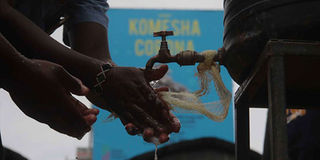KINYUA: Insensitive politicking bad for war on virus

It’s the time to adhere to the safety guidelines of handwashing, sanitising hands, wearing face masks, avoiding crowds and staying at home. PHOTO | FILE | NATION MEDIA GROUP
What you need to know:
- Instead of prioritising seeking a solution to the crisis, endless politicking and even politicisation of the pandemic has taken the centre stage.
- Our leaders should be thinking about post-coronavirus measures, such as food security and economic stability, in order to shield Wanjiku in her already fragile state.
In 1918, a pandemic said to be the deadliest struck, killing a whopping 50 million people in two years. The Spanish Flu, an unusually deadly influenza caused by the H1N1 virus, infected 500 million, then a third of the world population.
Several arguments, mostly medical, have been floated to explain the high mortality rate. One is that the virus triggers a cytokine storm, which compromises the immune system of young adults. Recent studies point a finger at the aftermath of World War I.
A 2007 analysis concluded that the viral infection was most likely more aggressive than previous influenza strains due to malnourishment, overcrowded medical camps and hospitals and poor hygiene, all exacerbated by WW1, which ended in 1918, which promoted a bacterial super-infection that killed most of the victims.
WW1 began on June 28, 1914, when Gavrilo Princip, a Bosnian Serb Yugoslav nationalist, assassinated the Austro-Hungarian heir Archduke Franz Ferdinand in Sarajevo, a conflict principally triggered by politics — geopolitics, to be specific.
Selfish and counterproductive politicking led to a war that left the world devastated and vulnerable to a pandemic.
POLITICKING
Slightly over a century later, Covid-19, also widely referred to as coronavirus, which has become a global disaster in just six months — poses a similar, and perhaps more lethal — threat than the Spanish Flu. The virus has so far infected about six million people and killed over 350,000 worldwide.
Yet, just like in 1918, instead of prioritising seeking a solution to the crisis globally and locally, endless politicking and even politicisation of the pandemic has taken the centre stage.
The United States and China, the two global powers, have dominated the headlines as they trade blows day in, day out, accusing each other of originating the virus.
Here in Kenya, our efforts at combating the virus, which began very well, are quickly being watered down by totally primitive politicking.
As the infection and casualty figures soar, Health Cabinet Mutahi Kagwe has been a victim of a seemingly well-choreographed smear campaign, and the usual 2022 succession politics have reclaimed the stage.
Factions are maximising on the situation to score political points, not bothered about if the very voters they will depend on to win in 2022 will be alive or not.
CHANGE TACK
Politicians spend more resources on branding sanitisers and face masks with their names and photos than they do on buying the protective gear.
To win the Covid-19 war, we definitely have to change tack. This is not the time to think about who will be the next president, governor, MP and so on. This is the time to save our lives; to abandon our infamous election-to-election campaign fever and pool efforts to combat this deadly virus or perish.
It’s the time to adhere to the safety guidelines of handwashing, sanitising hands, wearing face masks, avoiding crowds and staying at home.
It’s the time to support the county leaders making invaluable contributions at the grassroots — like in Murang’a, where Governor Mwangi wa Iria has put up a 35-bed ICU in a record 21 days as a precautionary measure.
Our leaders should be thinking about post-coronavirus measures, such as food security and economic stability, in order to shield Wanjiku in her already fragile state. Otherwise, Covid-19 might teach us hard lessons on why endless politicking is catastrophic for nation building.
Mr Kinyua is a digital communication consultant and political analyst. [email protected].





